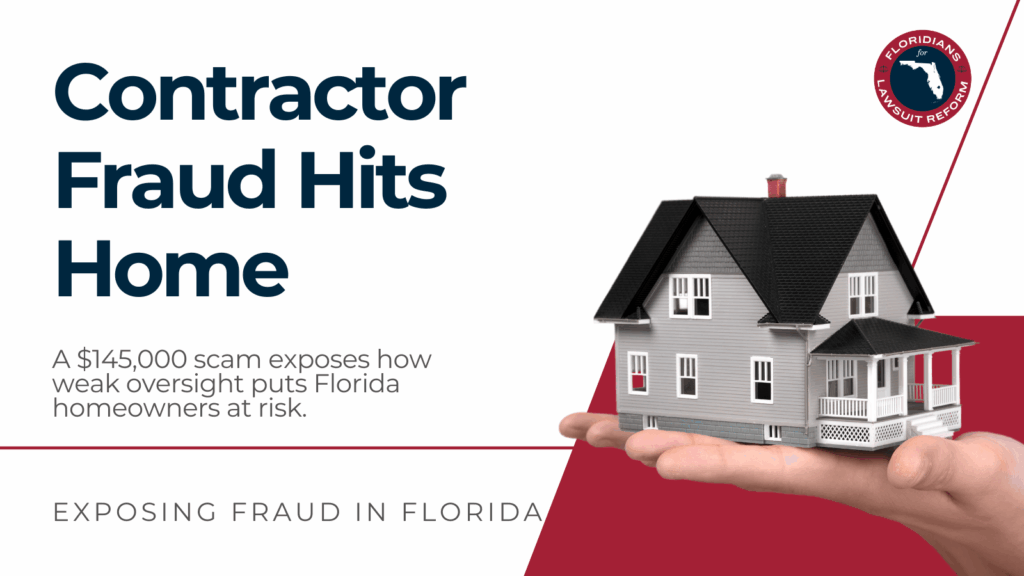
(This story was updated because an earlier version included an inaccuracy. LaCoste’s grand theft charge is a second-degree felony.)
After just over an hour of deliberation, a panel of Escambia jurors found an embattled contractor Jesse LaCoste guilty of grand theft and contractor fraud after he “evaporated” over $145,000 of a homeowners’ money and failed to finish a home remodel.
LaCoste was convicted Oct. 16 on one second-degree felony count of grand theft and one second-degree felony count of contractor fraud after he demolished Max Monastra’s home in 2021 and failed to finish the renovation.
“$145,000 evaporated, and Mr. Monastra is left with nothing,” prosecutor Paul Gillespie told the jury during closing arguments. “This was a clear and intentional plan to deceive, make false promises and (commit) fraud.”
After Monastra contracted with LaCoste and his company, he testified the workers gutted his home to renovate but eventually stopped coming to work on his home, leaving it in an unlivable state.
This is just one of many cases LaCoste faces in Escambia, Santa Rosa and Okaloosa counties related to other contractor fraud allegations, including a white-collar racketeering charge. LaCoste’s brother-in-law, Matthew Banks, similarly faces racketeering and other white-collar charges for allegations related to his contracting business.
Circuit Judge John Simon scheduled LaCoste’s sentencing hearing for Dec. 11 where LaCoste will face up to 30 years in prison if sentenced to the maximum on both counts.
Jesse LaCoste didn’t commit fraud since he used funds to pay for materials, defense argued
Throughout the trial, LaCoste and his attorney Todd Early argued LaCoste couldn’t have committed fraud since he used the funds drawn from Monastra to purchase materials and pay workers to begin the remodel.
“Mr. LaCoste used the funds that were taken to do the demolition on the house, to buy the materials, to resume the construction to build the entire structure, and he had to pay the workers to do it,” Early told the jury. “That’s not theft. That’s not theft.”
However, the jury seemingly sided with Gillespie in light of bank summaries that show the draws from Monastra to LaCoste’s business bank account were spent within short periods of time, with none of the purchases appearing to be spent on materials for Monastra’s home project.
Early did note that two other people, Kevin Stevens and Blaine Flynn, were signatories on the same business bank account, allowing them access to the funds. Early argued that their access provided reasonable doubt that the other purchases were solely made by LaCoste.
Jesse LaCoste attempted to have his case dismissed before the trial concluded
After the state rested its case, Early motioned for a judgment of acquittal for LaCoste, saying the case should be a civil matter, not a criminal matter.
“When someone shows up, they buy the material, they do work on the project, that negates the intent to commit a fraud,” Early told Judge Simon, citing case law. “At this point, we’re not arguing over what he did or didn’t do, we’re arguing over the value of what he did, (and) that would, in essence, reverse the burden of proof.
“What we have here is a civil case,” he added. “This is a civil case that has already been litigated, damages have been addressed, settlement has been entered into.”
Gillespie argued that the key factor separating LaCoste’s criminal case from a civil case are the “misrepresentations” made by LaCoste throughout the process, saying he entered multiple instances of misrepresentation into evidence during the trial.
“The state presented evidence of willful misrepresentation to commit the theft,” Gillespie told Simon. “The state presented evidence of unauthorized use or transfer of funds.”
One of the largest misrepresentations Gillespie offered as evidence was how LaCoste obtained his contractor license.
In the application for his Escambia contractor license, LaCoste said he worked for local company Landmark Engineering and obtained his necessary experience there. It was seemingly signed off by the company’s owner, Mark Spitznagel.
Spitznagel testified neither he nor his company ever employed LaCoste, and he said he never signed the document LaCoste used to obtain his license.
LaCoste appeared to do the same with his state license, saying he obtained experience with Atlas Builders Group under owner Chad Clark. However, Clark testified LaCoste did not work for Atlas nor did he sign off on any paperwork for LaCoste.
When making his decision, Simon said he agreed with the defense about the case being a civil matter, but he said “to do that, the court would have to put blinders on as to the other matters brought up by the state.”
“The state presented evidence that Mr. LaCoste provided false information in his application for a license,” Simon said. “It was not only the fact that he failed to disclose that he had criminal traffic citation convictions, but his experience and the jobs that he’s worked at.
“The intent, in this court’s opinion based on the evidence presented thus far in light most favorable to the state, the intent was formulated there,” he added. “When you provide false information to get a license and then use that license to solicit customers who believe you’re a licensed contractor … that is fraud, if the jury so chose to believe it.”
Simon then denied the motion to dismiss, and the jury returned to hear closing arguments before they decided to convict LaCoste.
This article originally appeared on Pensacola News Journal: Jesse LaCoste Matt Banks brother convicted of contractor fraud, theft
